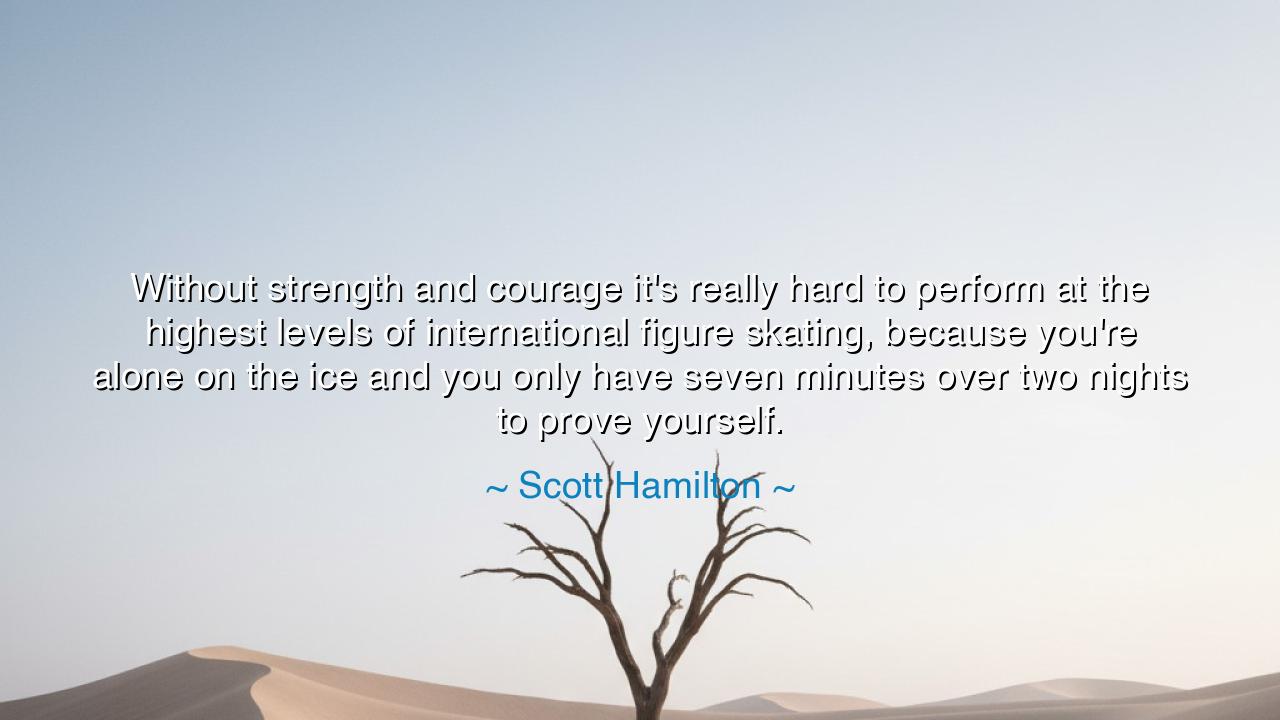
Without strength and courage it's really hard to perform at the
Without strength and courage it's really hard to perform at the highest levels of international figure skating, because you're alone on the ice and you only have seven minutes over two nights to prove yourself.






The legendary figure skater and Olympian Scott Hamilton, whose triumphs shimmered across the ice like poetry in motion, once declared: “Without strength and courage it’s really hard to perform at the highest levels of international figure skating, because you’re alone on the ice and you only have seven minutes over two nights to prove yourself.” In this simple yet profound statement lies not merely the wisdom of an athlete, but the truth of the human spirit itself. For Hamilton does not speak only of sport — he speaks of life, of isolation, of the brief, shining moments in which all our preparation, all our belief, must meet the world’s gaze. Those “seven minutes” are the measure of every destiny.
The origin of this reflection rises from the crucible of competition — from Hamilton’s own journey as a man who conquered not only the ice, but illness, doubt, and fear. Born small and frail, often sick, he was not the image of a champion. Yet through endless practice and unwavering spirit, he became one of the greatest figure skaters in history, an Olympic gold medalist, and a symbol of perseverance. When he speaks of strength and courage, he speaks from experience — for he knows that even the most dazzling performance rests upon invisible foundations: the strength to endure the grind of discipline, and the courage to face failure before a watching world.
The phrase “alone on the ice” is both literal and symbolic. In those fleeting minutes of competition, no coach can guide you, no friend can steady your hand. You are utterly exposed — to the judges, the audience, and most of all, to yourself. In this solitude lies the essence of mastery. The ancients would have likened it to the warrior entering the arena, the philosopher facing the tribunal, the artist standing before the blank canvas. Every soul must one day step into such solitude, armed only with what they have cultivated within. Hamilton’s words remind us that greatness demands solitude — and that in solitude, courage becomes the breath of life.
But the seven minutes — what a metaphor they are! In that narrow window, years of training, pain, and hope must be distilled into perfection. So too in life, we are each given our own moments of testing — brief, precious, and merciless. It may be an interview, a performance, a conversation that changes everything. The world will not see the thousand hours of effort behind it; it will see only the moment. And in that moment, as Hamilton teaches, it is not merely skill that determines our fate, but the strength to stay composed and the courage to believe that we belong there.
Consider the story of Wilma Rudolph, born prematurely and stricken with polio, told she would never walk again. Yet she learned not only to walk, but to run — and at the 1960 Olympics, she became the fastest woman on earth, winning three gold medals. Her seven minutes, too, were born from years of pain and persistence. Like Hamilton, she stood alone before the world, her past erased in the brilliance of her courage. Strength carried her body; courage carried her soul. Her story, like his, is a testament to the eternal truth: that those who conquer fear conquer fate.
Hamilton’s wisdom also reveals something quieter — that courage is not loud, nor is strength always visible. Courage may be the trembling skater who steps onto the ice after a fall, or the artist who returns to the canvas after rejection. Strength may be the endurance to rise before dawn, to practice when no one is watching, to persist when the heart is weary. True courage is not the absence of fear, but the mastery of it. As Hamilton himself showed in his later life — surviving cancer, returning to the ice, and using his voice to inspire others — courage is not just what wins medals; it is what sustains the human spirit.
So let this be the lesson to all who hear: your seven minutes will come. It may not be upon the ice, but it will come — the moment when you must stand alone, when no one else can perform in your place. Prepare for it. Build your strength in the quiet hours; train your courage in the face of small fears. And when the moment arrives, do not tremble before it. Trust the work you have done, and step forward with grace. The world may see only seven minutes, but you will know — it is a lifetime of courage that has brought you there.
Thus, as the ancients would say, strength and courage are the twin pillars of greatness. Without them, talent crumbles beneath pressure; with them, even the humblest soul may rise to glory. Scott Hamilton’s words are not just for athletes, but for all who dare to live fully. For in the end, life itself is like the ice — cold, uncertain, and dazzling — and each of us must find the courage to glide across it, alone, for a little while, and leave behind the mark of our truth before the light fades.






AAdministratorAdministrator
Welcome, honored guests. Please leave a comment, we will respond soon